INTRODUCTION
In certain circumstances, a well-written and well-structured cover letter is the key to securing an interview, regardless of how professional your CV is. Recruiters and HR professionals have a significant number of CVs to comb through in a short period of time, so they may only have a few minutes (or even seconds) to review your application.
Most recruiters in this area are seeking a very precise set of talents or a list of prerequisites, so a Cover Letter for a Lifesciences Job may be your greatest chance at showcasing why you’re the ideal candidate. Preclinical can provide insider advice on what to put in your cover letter to increase your chances of landing the life science job of your dreams.
Here are 7 Essential Tips to Write a Cover Letter for a Lifesciences Job;
1. State your existing status and desires clearly.
Recruiters must be able to rapidly extract fundamental information from your cover letter, such as why you want to work for the firm, any personal needs you have, your notice period, and whether or not you want to move. You’re one step closer to an interview if you make this material readily available and it checks all of their criteria.
Avoid using general phrases like “It would be a terrific chance to work for such a respected firm” when describing why you wish to work for the organization. Instead, wow them with a sincere and well-thought-out explanation.
2. Tailor your cover letter to the job.
There is no question that your CV is a primary emphasis for companies; thus, make sure that your Cover Letter for a Lifesciences Job complements it by being equally clear and precise. Our recruitment gurus all agree that the primary purpose of a cover letter is to highlight your most relevant core talents and competencies that are best suited to the post at hand.

For example, if you are looking for a CMC position in regulatory affairs, your cover letter should emphasize your talents and expertise in this subject right away. Any more talents may be added to your CV later if necessary.
As you compose the cover letter, have the job description nearby so you can provide concrete examples from your experience to match each bullet point. This will assist you in demonstrating that you are the greatest answer to their situation.
3. Provide as many detailed instances as possible.
Because your CV is likely to have numerous quick bullet points summarizing your talents and experience, a Cover Letter for a Lifesciences Job is an excellent chance to elaborate on these topics. This is critical since you must be able to demonstrate why you are qualified for the position and how you will provide value.
Important information to include may be the work you’ve done in a certain therapeutic area, samples of specific projects you’ve worked on, or a product you’ve launched in the field that the position is concerned with.
Include any international experience you’ve got and how your knowledge of different markets might assist the organization. The goal is to make engaging and impressing the recruiter or employer as simple as possible. The applicant will be more desirable if his or her skill set is more precise and relevant.
4. Highlight your professional accomplishments and any existing networks.
Standing out from the crowd may be challenging, but including some important professional accomplishments on your cover letter will help you stand out. For example, if you successfully oversaw a clinical research study, founded a new business unit in another nation, or were recognized internally as a high performer at a prior job, give some short information about these accomplishments.
If you’ve built a strong network over the course of your career, your Cover Letter for a Lifesciences Job is an excellent chance to include any high-profile individuals you know. For example, if you are a medical affairs professional, showing contacts with top physicians in certain therapeutic areas as well as a high reputation with important opinion leaders might be critical in securing an interview.
5. Personalize while demonstrating your writing abilities.
As previously said, your CV is a succinct description of your important abilities and experience, but it provides a limited chance to show your ability to express information correctly. A cover letter provides you with a blank canvas on which to express yourself while being inconspicuous.
It’s crucial to note that, although recruiters and employers are primarily looking for the greatest skill set, they’re also looking for someone who will be a cultural fit inside the company. Most essential, remember to proofread your letter completely! Recruiters may question your attention to detail and writing abilities if you make spelling and punctuation errors.

Although a Cover Letter for a Lifesciences Job is not usually the most crucial component of a job application for all of the various life sciences professions, there is a lot of evidence that a solid cover letter may help you get interviews and prepare for them.
This is due to the fact that it is a vital exercise in learning how to convey effectively why you are the greatest match for the position, which will aid you when answering interview questions later on.
6. Use numbers to demonstrate outcomes.
Don’t be hesitant to showcase your greatest work from your career, as long as it’s relevant. If you’ve increased marketing leads via a campaign, rebranded an entire product line or developed sales leads month after month, say so – ideally with statistics.
Being able to demonstrate to any company that you have a basic grasp of reporting may put you ahead of other applicants. It demonstrates that you are business-driven, that everything you do can be recorded and assessed, and that you are a results-driven employee.
7. Keep an eye out for grammatical errors.

Be cautious with your grammar, since it might rapidly land you in the ‘no’ pile. When creating a well-written Cover Letter for a Lifesciences Job, it is critical to read, re-read, and have someone else check it (and your CV). When you’ve been working on something for a long time, it’s easy to ignore little flaws.
Also Read: 10 Most Successful Chief Medical Officers







